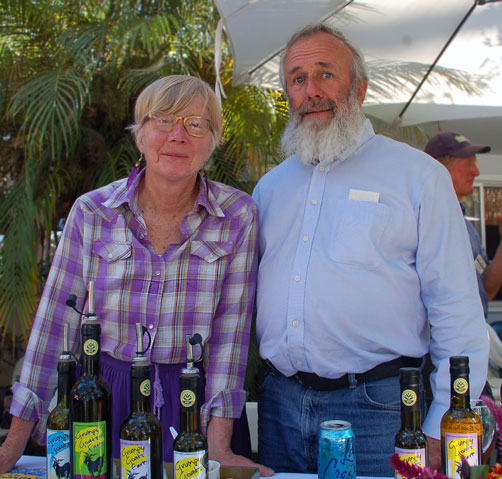
Pamela and Stuart
MEET THE FOUNDERS
Stuart Littell and Pamela Marvel are partners in life and in business. When Pamela prepared to make good on a life-long dream –to live in the country as she had growing up on a dairy farm in Wisconsin–. Stuart was a full backer and supporter. Pamela wanted to be an active participant in rural life too, a traditional farmer who grew crops, nurtured the soil and improved the environment. After some deliberation, they decided to look for the ideal place to locate a small olive orchard, where they could produce their own olive oil. In early 2008 they bought a 20 acre farm in Capay Valley, about 35 miles west of Sacramento. It was just an alfalfa field.
Stuart and Pamela have a set of shared values that have guided their work on the farm. Pamela comes from a family of Norwegian and German farmers, some of whom immigrated to the Midwest in the 1800s. Good stewardship of the land was important to these farmers, including her parents, who set a fine example of good farming practices and hard work. Stuart’s Scottish grandparents helped manage national parks in the Sierras for decades. His family has a deep affection for nature, and a strong interest in caring for the environment. It was natural, therefore, for Stuart and Pamela to farm organically, to use good conservation practices, to develop wildlife habitat, to use native species of plants for habitat and cover crops, and in general to live a life respectful of nature.
More about the Founders
Pamela and Stuart also have complementary talents that they put to good use developing the farm: Pamela is an experienced project manager, having worked for information technology firms in Silicon Valley for years. Stuart is a skilled general contractor who designs and builds beautiful homes. He is also an expert mechanic, and has a fine stable of old Chevy trucks.
Together they have made good progress on the farm: there are now 3000 olive trees on 17 acres. Coratina, Picual, Pendolino, Itrana, Barnea, Hojiblanca, and Nocellera del Belice varietals have been planted. Hedgerows of native trees, shrubs, flowers for birds and pollinators are thriving. Dozens of shade and fruit trees have been planted around the farmstead. Drip irrigation has been installed throughout. The work continues.
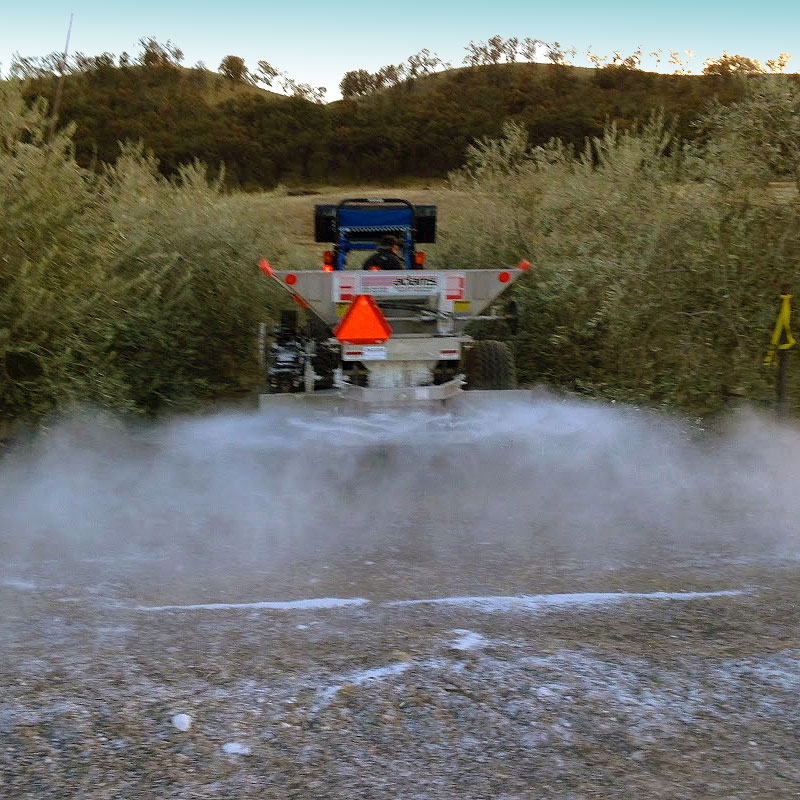
Farming Practices
We prune our trees in deep winter to optimize fruit production and harvesting. In the spring we mow the cover crop several times, and apply organic compost and gypsum to the soil. A drip irrigation system monitors soil moisture in the fields, which we use to guide our summer irrigation levels. We send leaf samples to the lab in July to determine the nutrient needs of our trees. During the summer months we apply organic sprays to control olive fruit fly, and fertilize the olives by using the irrigation system to apply liquid organic fertilizer to each tree. The olives are ready for harvest in late October and November.
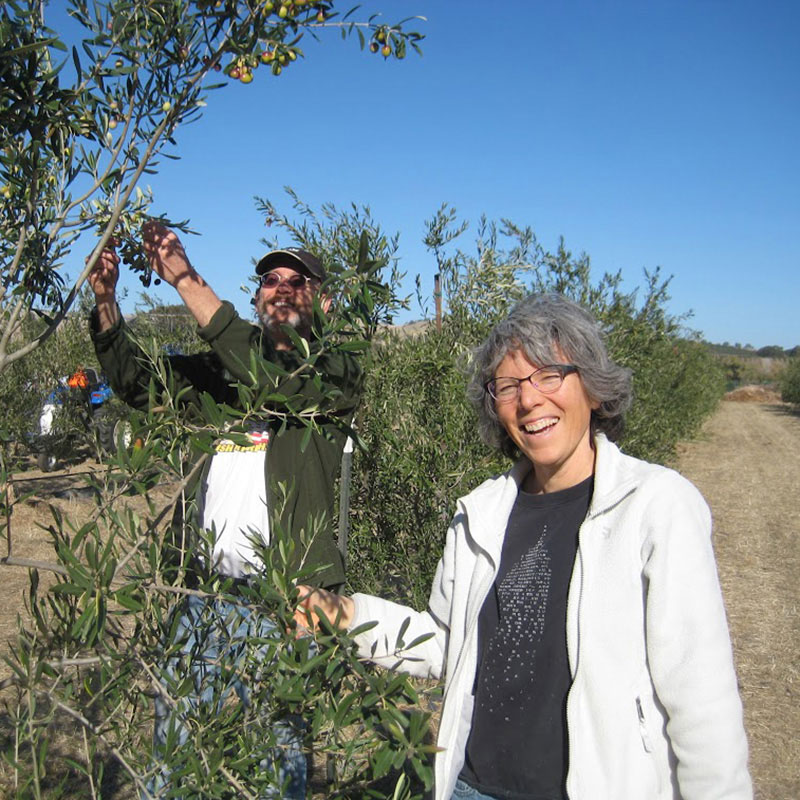
Harvesting
Olives ripen at their own pace. In choosing a harvest date, we carefully balance several factors: optimum taste profile, maximum level of polyphenols, availability of picking crews and mills, and the average frost date for our area – which is near Thanksgiving Day. Frost can damage olives. Young Coratina olive trees will produce a sharper flavor, so we will try to harvest as late as possible to ensure a balanced oil in terms of fruitiness, bitterness and pungency – the three pillars of the taste profile of good extra virgin olive oil.
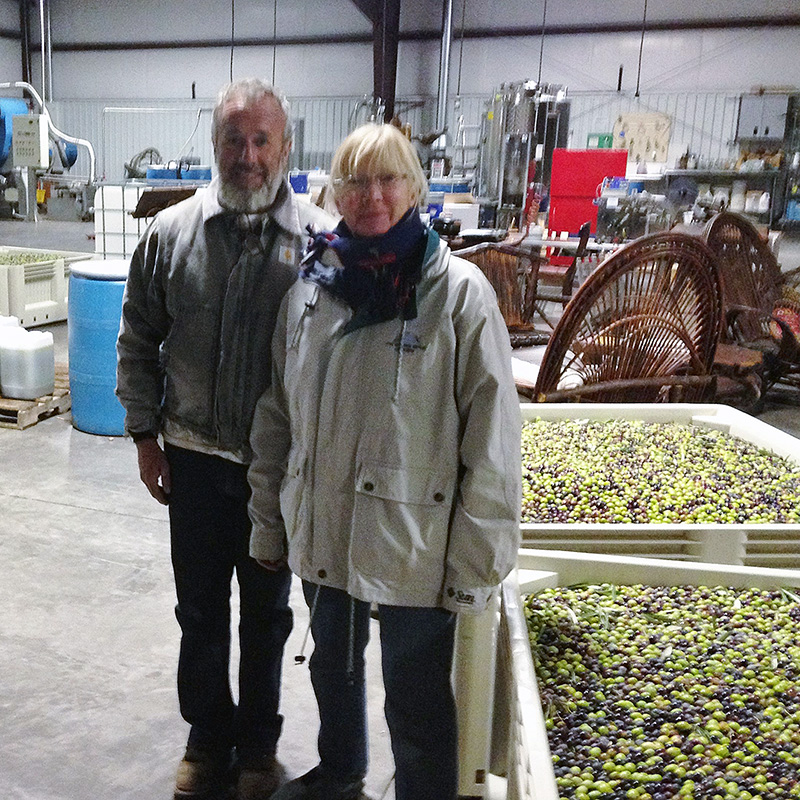
Milling
At the end of a harvest day, we truck our fresh-picked olives to the mill. At the mill we have a choice of using a three-wheel granite stone-crusher and or the 3 ton/hour blade crusher. This gives us some options for enhancing the taste profile, since stone crushing will likely yield a softer oil. The milled olives are then passed through a 4 batch malaxer, 3-phase decanter, a final separator, and stored until bottled.
Press
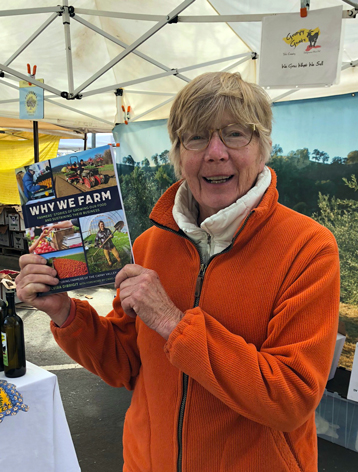
In 2017 our neighbor Elvira Dibrigit published a book of farmers’ stories of growing our food and sustaining their business. “Why We Farm” shined a spotlight on the challenges and rewards of independent farming, and featured farmers of the Capay Valley, including Grumpy Goats Farm.
Stuart and I were delighted to be interviewed in 2015 by the Good Day morning show on Sacramento’s CBS channel 13 TV. They were interested in hearing about our farming practices and what goes into making award-winning olive oil.
See links below if you want to view the two short segments that were filmed:
http://gooddaysacramento.cbslocal.com/video/3266971-olive-oil-farm/
http://gooddaysacramento.cbslocal.com/video/3266986-olive-oil-farm-pt-2/
Western Farm Press visited our farm and wrote about how Grumpy Goats Farm creates its award-winning oils.
http://westernfarmpress.com/orchard-crops/grumpy-goats-farm-recognized-extra-virgin-olive-oil
